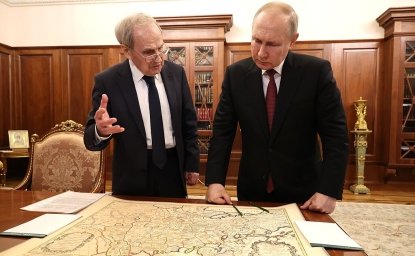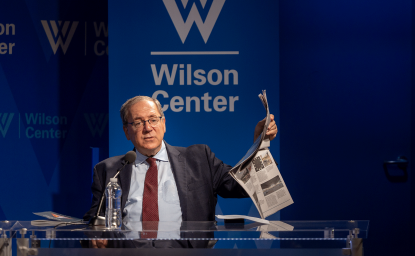The Prospects for a Sino-Russian Strategic Partnership

The idea of a Russian-Chinese strategic partnership that Russian President Boris Yeltsin and Chinese President Jiang Zemin first proclaimed five years ago, in April 1996, evokes memories of the Sino-Soviet alliance of half a century ago, but it is actually nothing of the sort," stated Steven Levine, Mansfield Professor of Asia Pacific Studies, University of Montana at a 11 April 2001 panel discussion at the Kennan Institute cosponsored by the Wilson Center's Asia Program. The panel also included Aleksei Voskressenski, Professor and Head, Department of Asian Studies, MGIMO-University, Moscow, and former Regional Exchange Scholar, Kennan Institute; Jeanne Wilson, Associate Professor, Department of Political Science, Wheaton College; and discussant Alexander Lukin, Visiting Fellow, Center for Northeast Asian Policy Studies (CNAPS), Foreign Policy Studies, Brookings Institution. Rather than a relic of the cold war, the panel agreed, the strengthening relationship between China and Russia is driven by a complex set of shared interests and different priorities.
China and Russia share a mutual interest in a stable border. By the late 1990s, Moscow and Beijing had resolved a long-standing border conflict that had once threatened to engulf the Soviet Union and China in outright war. Both Russia and China are also interested in limiting U.S. influence in Central Asia, as well as maintaining political stability in these new states.
The economic forces unleashed by globalization also work to reinforce this cooperative relationship, according to Voskressenski. While benefiting from international trade, Russia and China are also concerned about lagging behind Western nations more fully integrated into the global economy. Both nations seek to mitigate the negative consequences for globalization by promoting increased cross-border trade. China benefits from increased access to Russian energy supplies and Russia benefits through greater integration of the Russian Far East into the Pacific economy. Another aspect of the economic relationship between Russia and China is one that strongly concerns the United States--Russian arms sales to China. Wilson noted that 70 percent of Russia's arms sales went to China in 2000. For Russia, these sales represent a very important source of export earnings that also keep several enterprises in Russia's defense industry afloat. China, in turn, relies on Russia for sophisticated arms and military technology, as it is cut off from arms sales from the West.
It is international politics, however, that throws Russia and China together with the greatest urgency and public fanfare. Both Moscow and Beijing view with alarm the economic, political, and military dominance of the United States in global affairs. In their eyes, Lukin stated, they are defending an international order rooted in the United Nations, where each holds veto power in the Security Council, from a United States bent on changing that order to its own advantage. NATO's bombing of Yugoslavia over Kosovo was particularly important in convincing Moscow and Beijing of the need to strengthen security ties. Both China and Russia are multinational countries, Lukin noted, and they wonder why the U.S. felt it could bomb Yugoslavia and not China and Russia, or even Turkey, for the same crime.
If the United States provides China and Russia with the strongest reason to unite, it is also the greatest source of contradiction in the relationship. Both China and Russia view their own bilateral relations with the United States as more important than their developing strategic partnership, the panelists agreed. Each also suspects the other of being willing to cut separate deals over vital security matters. Russia values China's cooperation in voicing opposition to U.S. hegemony, but it knows that China would not endanger its economic ties with the West over another round of NATO expansion. Bilateral trade between Russia and China may have reached a record $8 billion in 2000, but this figure is only 1.7 percent of China's trade volume and is dwarfed by China's $75 billion trade with the United States. China, on the other hand, is very concerned over any form of missile defense, given its limited nuclear deterrent and its desire to intimidate Taiwan with missiles based across the strait. China suspects that Russia may be willing to cut a deal with the West on missile defense that would negate China's deterrent without damaging Russia's.
Another challenge in the relationship is the reversal in relative power since the cold war. This change is evident in the demographic situation developing in the Russian Far East. Sparsely populated to begin with, the Russian population of the region is in decline. Over the border lies China, with the world's largest population and memories of territories annexed by the Russian Empire through a series of unequal treaties. If the security relationship between Russia and China is to endure as more than a reaction to the United States, they will need to come to terms with the shift in power and manage such vexing issues as the Russian Far East.
In short, the panelists agreed, the Sino-Russian relationship will fall far short of a military alliance and will be based upon independently derived assessments of their convergent mutual interests. A strong relationship between these states is a positive trend, as it promotes stability in the region and economic develop-ment. An element of that relationship will be to challenge the United States, but that challenge will be mitigated by each nation's interest in maintaining positive relations with the United States.
Author


Kennan Institute
The Kennan Institute is the premier US center for advanced research on Eurasia and the oldest and largest regional program at the Woodrow Wilson International Center for Scholars. The Kennan Institute is committed to improving American understanding of Russia, Ukraine, Central Asia, the South Caucasus, and the surrounding region though research and exchange. Read more

Explore More
Browse Insights & Analysis
Dr. Karina Korostelina: From Crimea to Global Peacemaking


